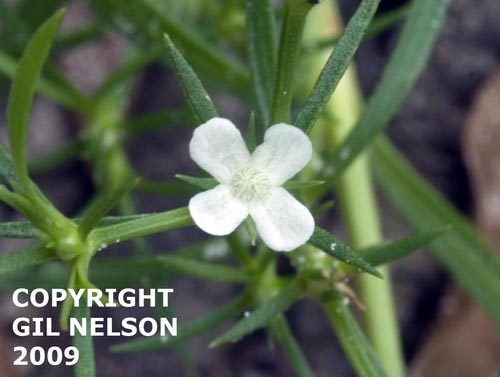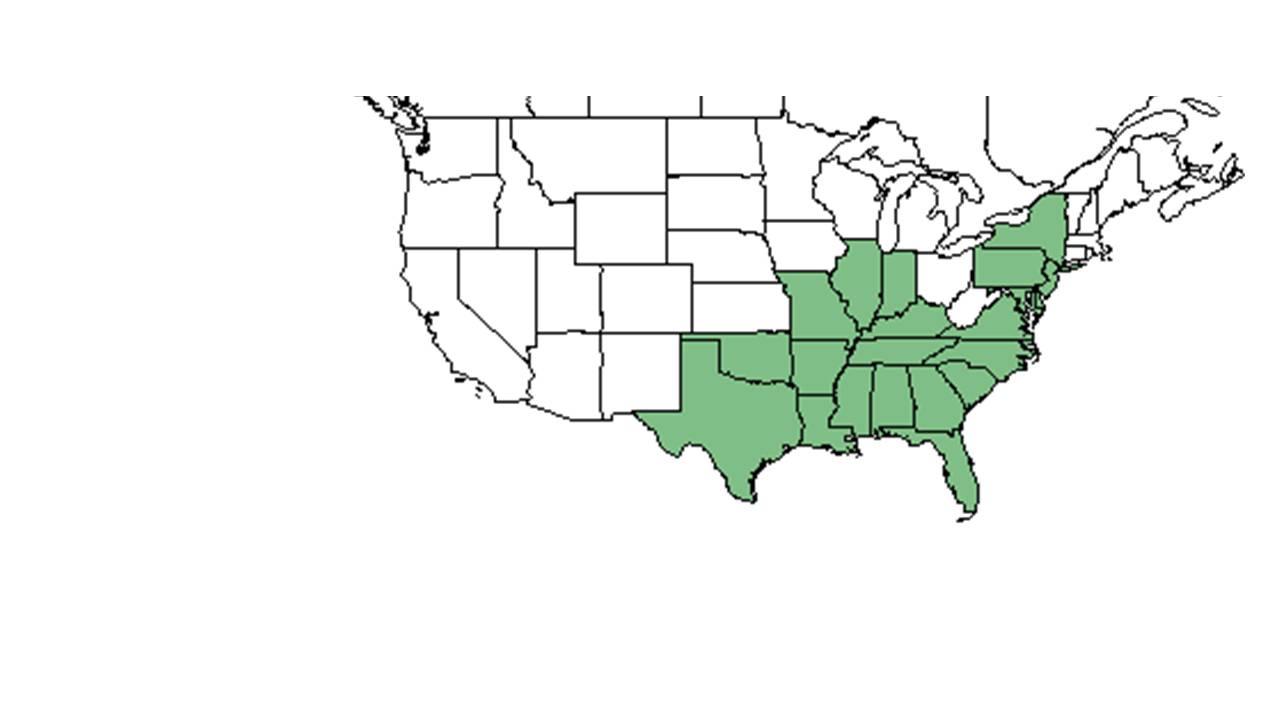Difference between revisions of "Polypremum procumbens"
KatieMccoy (talk | contribs) |
KatieMccoy (talk | contribs) (→Ecology) |
||
| Line 26: | Line 26: | ||
==Ecology== | ==Ecology== | ||
===Habitat=== <!--Natural communities, human disturbed habitats, topography, hydrology, soils, light, fire regime requirements for removal of competition, etc.--> | ===Habitat=== <!--Natural communities, human disturbed habitats, topography, hydrology, soils, light, fire regime requirements for removal of competition, etc.--> | ||
| + | In the Coastal Plain in Florida and Georgia, ''P. procumbens'' can be found in open woodlands near streamlet crossing, well drained sandy soils of citrus furrows, annually burned savannas, sandy soils of exposed karst pond shores, annually burned longleaf pineland, well drained uplands, and coastal dunes (FSU Herbarium). It can also be found in compacted soils of roadways, frequently mowed lawns, and roadside depressions. Associated species include ''Lindernia, Murdannia, Kyllinga and Sida'' (FSU Herbarium). | ||
===Phenology=== <!--Timing off flowering, fruiting, seed dispersal, and environmental triggers. Cite PanFlora website if appropriate: http://www.gilnelson.com/PanFlora/ --> | ===Phenology=== <!--Timing off flowering, fruiting, seed dispersal, and environmental triggers. Cite PanFlora website if appropriate: http://www.gilnelson.com/PanFlora/ --> | ||
===Seed dispersal=== | ===Seed dispersal=== | ||
| Line 44: | Line 45: | ||
Deyrup observed this bee, Dialictus nymphalis, on P. procumbens (Deyrup et al 2002). Cover of P. procumbens decreased significantly through time after three grazing treatments (no grazing by deer or cattle, grazing by deer, or grazing by deer and cattle) in thinned and clearcut forested areas (Brockway and Lewis 2003). | Deyrup observed this bee, Dialictus nymphalis, on P. procumbens (Deyrup et al 2002). Cover of P. procumbens decreased significantly through time after three grazing treatments (no grazing by deer or cattle, grazing by deer, or grazing by deer and cattle) in thinned and clearcut forested areas (Brockway and Lewis 2003). | ||
===Diseases and parasites=== | ===Diseases and parasites=== | ||
| + | |||
==Conservation and Management== | ==Conservation and Management== | ||
==Cultivation and restoration== | ==Cultivation and restoration== | ||
Revision as of 15:03, 5 October 2015
| Polypremum procumbens | |
|---|---|

| |
| Photo taken by Gil Nelson | |
| Scientific classification | |
| Kingdom: | Plantae |
| Division: | Magnoliophyta – Flowering plants |
| Class: | Magnoliopsida – Dicotyledons |
| Order: | Scrophulariales |
| Family: | Buddlejaceae |
| Genus: | Polypremum |
| Species: | P. procumbens |
| Binomial name | |
| Polypremum procumbens L. | |

| |
| Natural range of Polypremum procumbens from USDA NRCS Plants Database. | |
Common name: juniper leaf
Contents
Taxonomic notes
Description
Distribution
Ecology
Habitat
In the Coastal Plain in Florida and Georgia, P. procumbens can be found in open woodlands near streamlet crossing, well drained sandy soils of citrus furrows, annually burned savannas, sandy soils of exposed karst pond shores, annually burned longleaf pineland, well drained uplands, and coastal dunes (FSU Herbarium). It can also be found in compacted soils of roadways, frequently mowed lawns, and roadside depressions. Associated species include Lindernia, Murdannia, Kyllinga and Sida (FSU Herbarium).
Phenology
Seed dispersal
Seed bank and germination
Fire ecology
Pollination
The following Hymenoptera families and species were observed visiting flowers of Polypremum procumbens at Archbold Biological Station (Deyrup 2015):
Halictidae: Lasioglossum nymphalis
Megachilidae: Megachile brevis pseudobrevis
Sphecidae: Cerceris blakei, Microbembex monodonta
Vespidae: Stenodynerus fundatiformis
Use by animals
Deyrup observed this bee, Dialictus nymphalis, on P. procumbens (Deyrup et al 2002). Cover of P. procumbens decreased significantly through time after three grazing treatments (no grazing by deer or cattle, grazing by deer, or grazing by deer and cattle) in thinned and clearcut forested areas (Brockway and Lewis 2003).
Diseases and parasites
Conservation and Management
Cultivation and restoration
Photo Gallery
References and notes
Brockway, D. G. and C. E. Lewis (2003). "Influence of deer, cattle grazing and timber harvest on plant species diversity in a longleaf pine bluestem ecosystem." Forest Ecology and Management 175: 49-69.
Deyrup, M.A. and N.D. 2015. Database of observations of Hymenoptera visitations to flowers of plants on Archbold Biological Station, Florida, USA.
Deyrup, M. J. E., and Beth Norden (2002). "The diversity and floral hosts of bees at the Archbold Biological Station, Florida (Hymenoptera: Apoidea)." Insecta mundi 16(1-3).